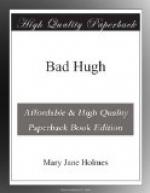so tearfully, that he had said to her at last he did
but jest to hear what she would say, and, though she
seemed satisfied, he felt there was a shadow between
them—a shadow which was not swept away,
even after he promised to read the little Bible she
gave him and see for himself whether he or she were
right. He had that Bible now hidden away where
no curious eye could find it, and carefully folded
between its leaves was a curl of golden hair.
It was faded now, and its luster was almost gone,
but as often as he looked upon it, it brought to mind
the bright head it once adorned, and the fearful hour
when he became its owner. That tress and the
Bible which inclosed it had made Hugh Worthington
a better man. He did not often read the Bible,
it is true, and his acquaintances were frequently
startled with opinions which had so pained the little
girl on board the
St. Helena, but this was merely
on the surface, for far below the rough exterior there
was a world of goodness, a mine of gems, kept bright
by memories of the angel child which flitted for so
brief a span across his pathway and then was lost
forever. He had tried so hard to save her—had
clasped her so fondly to his bosom when with extended
arms she came to him for aid. He could save her,
he said—he could swim to the shore with
perfect ease and so without a moment’s hesitation
she had leaped with him into the surging waves, and
that was about the last he could remember, save that
he clutched frantically at the long, golden hair streaming
above the water, retaining in his firm grasp the lock
which no one at Spring Bank had ever seen, for this
one romance of Hugh’s seemingly unromantic life
was a secret with himself. No one save his uncle
had witnessed his emotions when told that she was
dead; no one else had seen his bitter tears or heard
the vehement exclamation: “You’ve
tried to teach me there was no hereafter, no heaven
for such as she, but I know better now, and I am glad
there is, for she is safe forever.”
These were not mere idle words, and the belief then
expressed became with Hugh Worthington a firm, fixed
principle, which his skeptical uncle tried in vain
to eradicate. “There was a heaven, and she
was there,” comprised nearly the whole of Hugh’s
religious creed, if we except a vague, misty hope,
that he, too, would some day find her, how or by what
means he never seriously inquired; only this he knew,
it would be through her influence, which even now
followed him everywhere, producing its good effects.
It had checked him many and many a time when his fierce
temper was in the ascendant, forcing back the harsh
words he would otherwise have spoken, and making him
as gentle as a child; and when the temptations to
which young men of his age are exposed were spread
out alluringly before him, a single thought of her
was sufficient to lead him from the forbidden ground.




